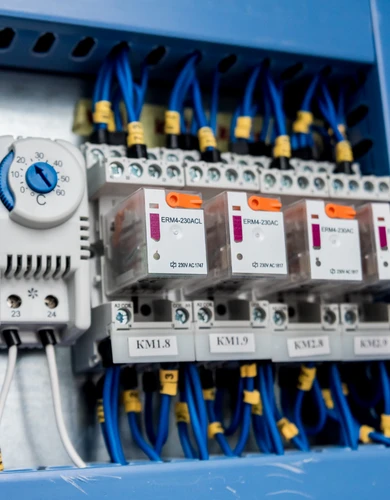How to Procure Renewable Energy with a Corporate PPA
Corporate Power Purchase Agreements (CPPAs) are long-term agreements that large businesses can use to purchase renewable energy sourced directly from British wind and solar farms.
CPPAs provide an opportunity to secure electricity prices for decades into the future and publicly demonstrate a commitment to green energy.
This guide takes you through the different stages of obtaining and implementing a corporate PPA for your business. Here’s what we cover:
- Why should businesses consider a corporate PPA?
- Choosing a PPA for your business
- Steps for negotiating a corporate PPA
- How businesses implement PPAs
- Are PPAs only for large businesses, or can SMEs benefit?
💡 We also have a separate guide explaining how Power Purchase Agreements work, providing background on how these are generally used in the British energy industry.
Why should businesses consider a corporate PPA?
Before diving into the details of choosing and implementing a corporate PPA, we outline the three key advantages of corporate PPAs for large business energy procurement.
Long-term price security
Corporate Power Purchase Agreements provide security and predictable pricing on wholesale energy purchases for the long term.
In our business energy comparison service, our suppliers only offer energy tariffs for up to five years, but a corporate PPA provides a longer period of price certainty.
Sustainability targets
Large businesses must report their carbon emissions in their public annual reports under Streamlined Energy and Carbon Reporting (SECR) rules. A corporate PPA allows these businesses to guarantee purchases of carbon-neutral energy products, reducing their Scope 2 emissions and helping large organisations execute their CSR strategies.
Brand reputation
Large public companies typically announce when they have entered into corporate Power Purchase Agreements to enhance their brand reputation and customer trust.
Nestlé, Microsoft, and Amazon are recent examples of corporate giants announcing their PPAs to bolster their profile.
Choosing a PPA for your business
We highlight the key decisions when choosing a corporate PPA for your business.
Fixed or variable prices
A corporate Power Purchase Agreement defines the business electricity price per kWh you will pay during the contract.
A fixed CPPA offers a completely fixed price per kWh, while the following variable options are also available:
- Market-indexed rate – The price per kWh will rise or fall in line with an inflationary measure.
- Hybrid pricing – A blend of fixed and market-indexed pricing.
We recommend choosing between fixed and variable options considering the overall aims of your business energy procurement strategy.
On-Site versus Off-Site
In an On-Site PPA, a renewable energy developer will install solar panels or a small-scale wind turbine on or near your commercial property. The power generator will be directly connected to your business using a private wire, providing an alternative power source to your business electricity connection.
If the generator produces more power than your business requires, you can store it using solar batteries or export it to the grid via a Smart Export Guarantee tariff.
The alternative, an Off-Site PPA, can be located anywhere on the British mainland. The power it generates will be distributed to your business using the national grid and delivered through your existing power supply.
💡 There is a third type of corporate PPA called a virtual PPA, which is a financial hedging arrangement where no physical power is delivered. Since this arrangement is very different, we won’t discuss it further in this guide.
Baseload versus pay-as-generated
A key part of a corporate PPA contract is the volume of electricity the seller promises to deliver during the contract.
A pay-as-generated contract means you only purchase electricity as and when it is generated from a named renewable energy asset, such as a specific wind farm.
In a pay-as-generated contract, the volume of energy delivered will be irregular and depend on weather conditions.
Alternatively, with a baseload CPPA, the seller agrees to deliver a minimum amount of power daily. The seller typically achieves this using power generated from a portfolio of different renewable energy sources.
Short versus long-term
Corporate PPAs are offered for 5 to 20 years and commit your business to purchasing generated electricity over that period.
CPPA agreements typically include an expensive early termination fee to cease purchasing the electricity before the end of the fixed term.
It is important to consider the likely future energy requirements of your business when choosing the term of your PPA.
Choosing a counterparty
Corporate PPAs are long-term agreements, so it is essential to trust that the generator will be able to deliver the promised volumes of renewable energy.
When entering into a PPA, evaluating the developer’s track record is important, considering the performance of their existing renewable energy assets.
Steps for negotiating a corporate PPA
This section outlines the key steps involved in agreeing to a corporate Power Purchase Agreement.
1. Expression of interest
A renewable energy project developer will typically request interest from potential PPA buyers during the initial construction of an asset.
Larger renewable energy developers, such as SSE, Scottish Power, and E.ON, are always open to new PPA buyers as they have large UK wind farm portfolios.
Renewable energy developers typically host a form on their website to allow you to contact their PPA team.
2. Term sheets
Initial discussions will involve negotiating the key terms of the corporate PPA agreement, including:
- Term
- Delivery type (baseload/pay-as-generated)
- Delivery volumes (expected daily power generated)
- Price per kWh delivered
3. Due diligence
Corporate Power Purchase Agreements are long-term contracts in which the seller bears the buyer’s credit risk, and the buyer bears the risk that the seller will deliver the generated power as promised.
With the significant risks involved, negotiating a CPPA typically includes a due diligence process that assesses:
- The creditworthiness of the buyer
- The technical and financial feasibility of delivering the renewable energy generator
How to negotiate better terms in a PPA
We have three recommendations for securing the best terms on a corporate Power Purchase Agreement:
- Optimise terms – Ensure that you thoroughly examine your business’s future energy requirements to optimise purchasing volume and contract length.
- Multiple proposals – Seek term sheets from multiple renewable energy developers to compare business electricity prices.
- Specialist advisors – Consider engaging a specialist energy consultant who can act as an independent advisor to help negotiate the terms on your business’s behalf.
How businesses implement PPAs
Off-site corporate Power Purchase Agreements require a business energy supplier to act as a sleeving party to facilitate power distribution to your business.
Using a business energy supplier to facilitate a corporate PPA usually means no changes are required to the way your business currently receives power from the grid.
In this section, we’ll present the key roles a business energy supplier plays in implementing a PPA.
Matching consumption to the delivery of power
Your business energy supplier will be responsible for balancing the renewable energy generated with your business’s demand.
Your supplier will use transactions on the wholesale market to ensure that your grid connection can always meet your business’s power demand.
Arranging power distribution
It will be necessary to pay, via your energy supplier, the distribution costs (TNUoS, BSUoS, and DUoS charges) associated with using the grid to distribute your power.
The distribution costs will be determined by the Distribution Network Operator grid your business is connected to and the location of the renewable energy asset in your PPA.
Arranging power distribution will incur both unit charges and business electricity standing charges.
Back-up power purchases
Where the demand of your business is higher than the amount of power generated by the PPA seller, your energy supplier will purchase the additional required power from the wholesale market.
The cost of additional power will depend on market conditions at the time of purchase.
Meter and other operational costs
A supplier is also responsible for various operational costs, including the maintenance and operation of your half-hourly electricity meters.
These additional operational costs will be factored into the daily standing charges included on your business electricity bill.
Are PPAs only for large businesses, or can SMEs benefit?
Corporate PPAs are typically only available for businesses with large annual business energy consumption.
Here are the typical minimum requirements for a corporate PPA:
- Off-Site PPA – Annual power consumption exceeding 2 million kWh.
- On-Site PPA – 25 acres of available land.
Below, we discuss the typical alternatives more accessible to small business energy customers.
Green business energy tariff versus corporate PPA
In a green business energy tariff, your business energy supplier will arrange to purchase electricity from renewable sources on behalf of your business.
Green tariffs are certified by the Renewable Energy Guarantees of Origin scheme to prove that the electricity supplied has been purchased from green sources.
Find out more in our guide to how green business energy tariffs are delivered.
Commercial solar panels
Smaller commercial sites can install a commercial solar system on spare roof space or unused land.
Similar to the structure of a corporate PPA, the upfront costs of purchasing solar equipment can be avoided using:
- External equipment financing
- Solar lease arrangements
Find out more in our guide to commercial solar costs.

